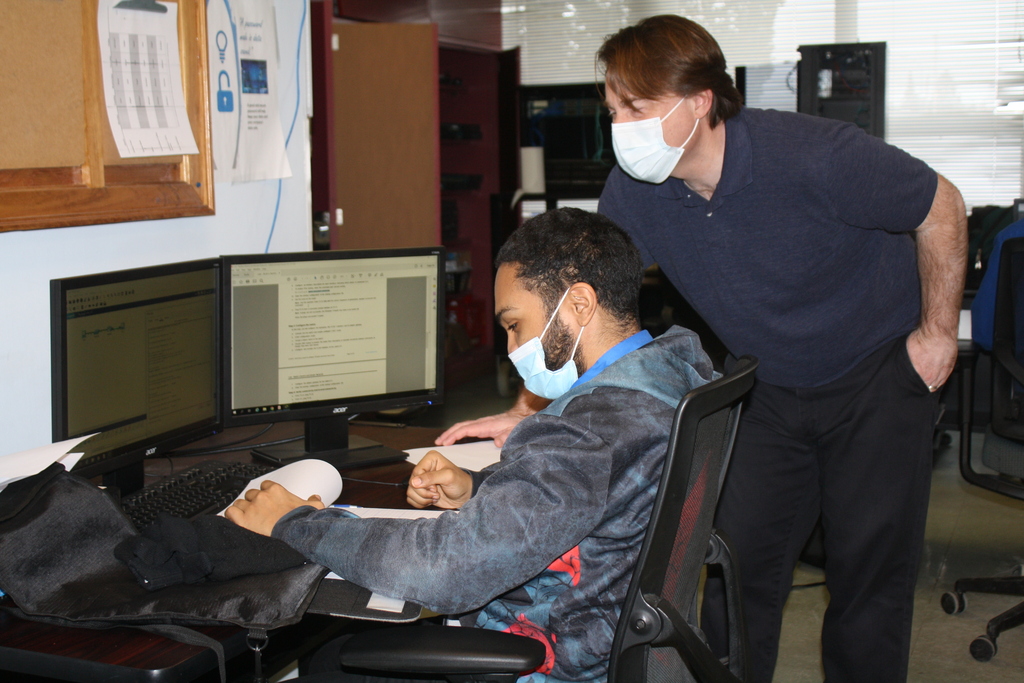
LIMESTONE, Maine — Despite being located in one of the farmost regions of Maine, Loring Job Corps in Limestone has become an ideal destination for students across the country who are looking to better their lives through job training.
Like community colleges, the 123 federally funded Job Corps centers in the U.S. focus on trades such as automotives, technology, culinary arts and transportation. But unlike those colleges, students do not pay tuition and often travel far from their hometowns and cities to attend programs. Instead of earning a degree, students leave with certifiable job skills that they can take into the workforce or college.
Loring Job Corps staff have seen the Limestone center grow from an experimental replacement of the area’s former Loring Air Force Base to a nationally recognized program in its placement of students in careers.
Loring currently ranks seventh against all other Job Corps centers based on criteria such as job placement and retention, average job wages and credentials that students earn during their time in the program.
“One of the things that makes Loring unique is that we offer different programs in the trades based on needs of the local area and career sector,” said Kristie Moir, Loring’s center director.
Approximately 15,000 students ages 16 to 24 have graduated from Job Corps programs at Loring since the center opened in 1997. In the past decade, 150 students have enrolled in college immediately after graduating.
Today’s student population of 127 is a significant increase from the 13 students who originally enrolled. Administrators credit that increase with the center’s reputation for graduating students qualified to enter trade fields where workers are in high demand.

Loring Job Corps student Brandon Rodriguez works on a project in the center’s Computer Networking Cisco classroom. (Melissa Lizotte | Aroostook Republican)
Loring’s most popular program is Computer Networking Cisco, which prepares students for the work required to maintain computer networks for mid-size and large companies. Other programs include heavy truck driving, automotives, carpentry, masonry, electrical, painting, culinary arts and advanced training in cybersecurity and computer system administration.
For 24-year-old Brandon Rodriguez of Long Island, New York, Loring has become the ultimate place to discover his passion for information technology. Rodriguez is now a Computer Networking Cisco student and is working toward becoming a network analyst.
Although Rodriguez previously attended community colleges and universities, he felt that those programs never quite fit his interests or financial needs. His desire to attend Loring and improve his career prospects increased when he unexpectedly found himself in need of housing.
Last summer Rodriguez was attending Loring’s 60-day online orientation and was not scheduled to arrive in Limestone until October. But a phone call with Moir led to him arriving two months earlier.
“After [the training] I did the scariest thing I had ever done and called Kristie to explain my situation. Twenty-four hours later I got an email saying ‘You’re good to go in six days’,” Rodriguez said. “She could see how much I needed this opportunity.”
While all students’ stories are different, everyone shares the drive to make life better for themselves and their families, said CJ Kelch, Loring’s career preparation specialist.

Loring Job Corps students Jorge Perla (left), Stephen Sanderson and Daniel Pablo complete training in the center’s advanced cybersecurity lab. (Melissa Lizotte | Aroostook Republican)
Though Loring typically has a few commuter students from local towns, most live in dorms that once housed the base’s airmen. Job Corps aims to serve economically disadvantaged students, which means that many who attend Loring are working toward their GED or driver’s license or want a more affordable way to gain long-term career skills.
Nearly 56 percent of Loring’s students are from Maine while 16 percent come from New York. The remainder hail from states as varied as Massachusetts, New Jersey, Florida and California.
Daniel Pablo, 22, an advanced cybersecurity student, said that the positive reputation of Loring’s computer training programs and close-knit community motivated him to choose the Limestone center.
“The instructors are there any time to answer questions and help us out,” said Pablo, who is from Long Island, New York. “When I first got here, there were students helping to show everyone the ropes.”
Regardless of whether students enter jobs or choose college or the military after graduation, Job Corps staff members have seen them gain both the practical and life skills needed to succeed.
Career counselor Bab Cote recalled seeing a former student after he had enlisted in the military and returned to Job Corps to celebrate graduation with his family.
“Seeing him in uniform with his wife and toddler made me burst out crying,” Cote said. “It was clear then that Job Corps gave him the opportunity to learn the skills he had needed.”
Correction: A previous version of this story misspelled Brandon Rodriguez’s last name and incorrectly listed his hometown.







